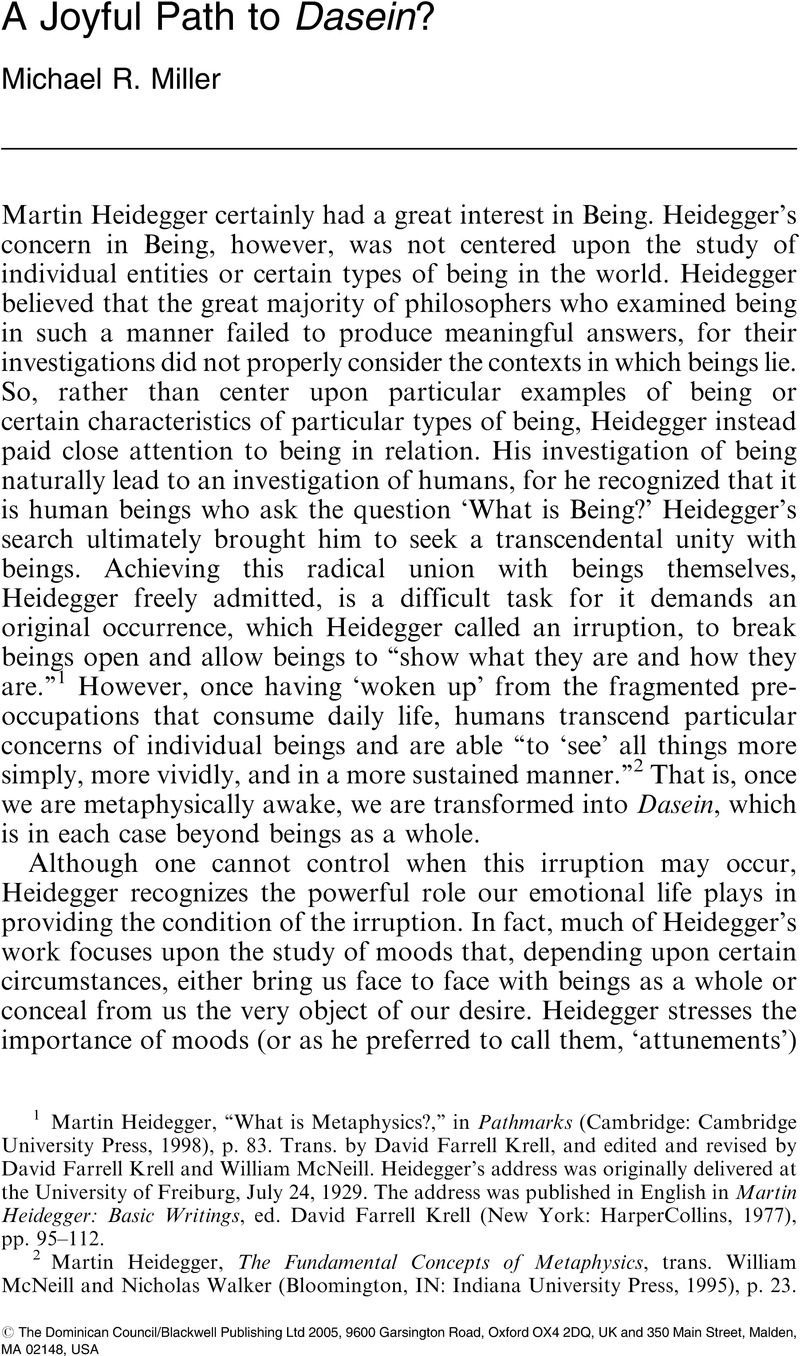Article contents
A Joyful Path to Dasein?
Published online by Cambridge University Press: 01 January 2024
Abstract

- Type
- Original Articles
- Information
- Copyright
- Copyright © The Dominican Council/Blackwell Publishing Ltd 2005, 9600 Garsington Road, Oxford OX4 2DQ, UK and 350 Main Street, Malden, MA 02148, USA
References
1 Heidegger, Martin, “What is Metaphysics?,” in Pathmarks(Cambridge: Cambridge University Press, 1998), p. 83CrossRefGoogle Scholar. Trans. by David Farrell Krell, and edited and revised by David Farrell Krell and William McNeill. Heidegger's address was originally delivered at the University of Freiburg, July 24, 1929. The address was published in English in Martin Heidegger: Basic Writings, ed. Krell, David Farrell (New York: HarperCollins, 1977), pp. 95–112Google Scholar.
2 Heidegger, Martin, The Fundamental Concepts of Metaphysics, trans. McNeill, William and Walker, Nicholas (Bloomington, IN: Indiana University Press, 1995), p. 23Google Scholar.
3 “What is Metaphysics?,” p. 87.
4 Ibid.
5 The Fundamental Concepts of Metaphysics, p. 7.
6 Heidegger, Martin, Being and Time, trans. Stambaugh, Joan (Albany, NY: The State University of New York, 1996), p. 128Google Scholar [p. 128 in original German edition].
7 Being and Time, p. 129 [p. 137].
8 Ibid., p. 129 [p. 137].
9 “What is Metaphysics?,” p. 89.
10 Ibid.
11 Ibid., p. 87.
12 The Fundamental Concepts of Metaphysics, p. 80.
13 Heidegger writes on p. 79 (Part I, Chapter 2, Section 19) of The Fundamental Concepts of Metaphysics: “By drawing attention to this profound boredom, it now seems as though we have done what we were attempting to avoid from the outset, namely ascertaining a fundamental attunement. Yet have we ascertained a fundamental attunement? By no means. We cannot ascertain one at all; indeed we are quite unable to do so, since it is entirely possible for everyone to deny that such an attunement is there. We have not ascertained one at all – indeed everyone will say we have arbitrarily asserted that such an attunement is at hand. Yet what is at issue is not whether we deny it or assert it. Let us simply recall what we asked: Do things ultimately stand in such a way with us that a profound boredom draws back and forth like a silent fog in the abysses of Dasein?” Italics added.
14 “What is Metaphysics?,” p. 96.
15 Ibid., p. 94.
16 Heidegger states definitively in The Fundamental Concepts of Metaphysics that “Attunements are feelings,” p. 65.
17 The Fundamental Concepts of Metaphysics, p. 64. Heidegger notes in this section that attunements belong to the being of man and that attunements are somehow connected to the peculiar manner of being ‘there and not there’ which is attributed to Dasein (pp. 63–65).
18 Being and Time, p. 286 [p. 310].
19 Ibid., pp. 316–7 [p. 345].
20 Quentin Smith correctly notes that scholars have long failed to recognize the authentic ‘findedness’ as being joyful in Heidegger's work (see, “On Heidegger's Theory of Moods” in The Modern Schoolman, Vol. 63, no. 4, May 1981) and he is the first philosopher I am aware of to recognize Heidegger's claim that Dasein must find itself in a variety of moods and not just anxiety and pure boredom.
21 “What is Metaphysics?,” p. 92.
22 Ibid., p. 93.
23 Ibid.
24 Ibid., p. 87.
25 Ibid.
26 Ibid., p. 93.
27 Ibid., p. 87; italics added.
28 The Fundamental Concepts of Metaphysics, p. 59.
29 Ibid., p. 70.
30 Ibid., pp. 76–77.
31 See Summa Theologica I‐II, Q. 31, a. 3. Although the nothing may not have moved Aquinas to any kind of raised self‐awareness, it is interesting to note that Aquinas believed that a person transcends her natural state when she either is raised to a higher knowledge by God, or when she is cast down into debasement, by violent passions or madness. (See Summa Theologica, I‐II, Q. 28, a. 3). Although I find it very interesting that Heidegger actually held what some may believe to be a very un‐Heideggerian position (that joy can be a fundamental attunement that reveals Dasein), I find it just as interesting to note that the Angelic Doctor agreed with Heidegger that some ‘bad moods’ may actually bring one to transcendence.
- 1
- Cited by




